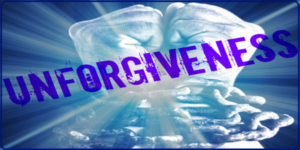Struggling To Forgive The Undeserving?
I Will Never Forgive Them For What They Did—Never!
 When feelings of anger, ill will, or bitterness well up at the mere mention or thought of someone’s name, we are most likely harboring unforgiveness. No special training is required to bear a grudge or harbor resentment; we are naturally wired that way. It is easy to justify unforgiveness because there is an active pain living inside our hearts and minds. We have been offended, hurt, and made to feel intense pain. It is often impossible to ignore the sea of pain raging on the inside. We have been wronged and now we want to extract a pound of flesh from the offending person.
When feelings of anger, ill will, or bitterness well up at the mere mention or thought of someone’s name, we are most likely harboring unforgiveness. No special training is required to bear a grudge or harbor resentment; we are naturally wired that way. It is easy to justify unforgiveness because there is an active pain living inside our hearts and minds. We have been offended, hurt, and made to feel intense pain. It is often impossible to ignore the sea of pain raging on the inside. We have been wronged and now we want to extract a pound of flesh from the offending person.
Many circumstances cause us to cling to unforgiveness. Broken marriages, failed romances, strained friendships, personal betrayals, sexual assault, rape, murder, and the list could go on and on. It could be that some of you reading this may have faced your own awful experience and are suffering from unforgiveness. Not long ago Americans were amazed by a Christian woman whose mother was murdered in cold blood by the Charleston church shooter. Here’s how she responded to the young murderer:
“I forgive you,” Nadine Collier, the daughter of 70-year-old Ethel Lance, said at the hearing, her voice breaking with emotion. “You took something very precious from me. I will never talk to her again. I will never, ever hold her again. But I forgive you. And have mercy on your soul.”
As I am writing I am listening to reports of a Florida school shooting with 14 wounded and 17 dead at the hands of 19-year-old Nikolas Cruz. Our hearts and prayers go out to the families and friends who have suffered the loss of their loved ones and now face the heartbreak no parent should ever have to deal with. This is purely an act of evil.
Understanding Forgiveness
Perhaps the best way to understand forgiveness is to understand what forgiveness is not. Forgiving others does not mean we agree with them or approve of what they did. Forgiveness is not pretending we were not wronged, offended, hurt, or acting as if nothing ever happened. Forgiveness does not mean we are required to forget that the offense ever occurred. None of this is what is meant by forgiveness. It is important to keep the right perspective on forgiveness as we move forward.
There is no greater authority on the subject of forgiveness than God. He is the author of forgiveness. Moreover, God has forgiven more people for more and greater wrongs than anyone else while at the same time, not one person deserved to be forgiven.
We, humans, are by nature a corrupt and immoral people—sinners through and through. We are always falling short of what is required (Romans 3:23). We are deserving of God’s wrath, not His forgiveness. Nevertheless, because of God’s great love, He gave us the gift of forgiveness that came through His son Jesus. Now the free gift of forgiveness was not free to God but purchased by Jesus on Calvary’s cross. The purchase price was the cruel and unmerciful crucifixion of our Lord and Savior as full payment for all our sins.
God made him who had no sin to be sin [a sin offering] for us, so that in him we might become the righteousness of God. (2 Corinthians 5:21)
Although we continually ignore and offend God by rejecting His Lordship over our lives, God’s amazing love motivated Him to demonstrate just how much he truly loves us by sending Jesus to suffer and die in our place. We understand that God’s forgiveness came to us through His love. Therefore, our capacity to forgive is connected to and empowered by our understanding and personal experience with God’s undeserved love, grace, mercy, and complete forgiveness. It is here that we learn from our personal and individual experiences what God’s love is all about.
But God demonstrates his own love for us in this: While we were still sinners, Christ died for us. (Romans 5:8)
When we honestly reflect upon the full wretchedness of our own lives and comprehend the undeserved forgiveness we received as a free gift from God, we are empowered to forgive others. Having received this undeserved forgiveness from God and remaining unwilling to forgive others is just plain wrong for a true follower of Christ. To illustrate this point let’s read the parable Jesus shared on forgiveness:
Then Peter came to Jesus and asked, “Lord, how many times shall I forgive my brother or sister who sins against me? Up to seven times?”
Jesus answered, “I tell you, not seven times, but seventy-seven times.[a] 23 “Therefore, the kingdom of heaven is like a king who wanted to settle accounts with his servants. 24 As he began the settlement, a man who owed him ten thousand bags of gold[b] was brought to him.25 Since he was not able to pay, the master ordered that he and his wife and his children and all that he had be sold to repay the debt. 26 “At this the servant fell on his knees before him. ‘Be patient with me,’ he begged, ‘and I will pay back everything.’ 27 The servant’s master took pity on him, canceled the debt and let him go. 28 “But when that servant went out, he found one of his fellow servants who owed him a hundred silver coins.[c] He grabbed him and began to choke him. ‘Pay back what you owe me!’ he demanded. 29 “His fellow servant fell to his knees and begged him, ‘Be patient with me, and I will pay it back.’ 30 “But he refused. Instead, he went off and had the man thrown into prison until he could pay the debt. 31 When the other servants saw what had happened, they were outraged and went and told their master everything that had happened. 32 “Then the master called the servant in. ‘You wicked servant,’ he said, ‘I canceled all that debt of yours because you begged me to. 33 Shouldn’t you have had mercy on your fellow servant just as I had on you?’ 34 In anger his master handed him over to the jailers to be tortured, until he should pay back all he owed. 35 “This is how my heavenly Father will treat each of you unless you forgive your brother or sister from your heart.” (Matthew 18:21-35)
MORAL: Like the servant in the parable, our sin debt is impossible to pay because the payment for sin is death (Romans 3:23). We are helplessly and deservedly bound for eternal destruction in a place called hell. We are condemned by our own sinful behavior that testifies against us. Amazingly, Christ steps in and cancels our sin debt at no cost to us by suffering in our place. Our cross becomes His cross. Our suffering becomes His suffering. Complete forgiveness and eternal life are offered as free gifts when we turn to God in true repentance. Along comes our fellow man who has wronged us and we cannot forgive them for their sin, even though their offense pales in comparison to our own sin debt that we could never repay. We had no problem with God rescuing our wicked caucus from the flames of an eternal hell that we surely deserved. We greatly rejoiced that we received eternal life. But for our fellow man who has wronged us, we refuse to let go of the offense. Our unforgiving self-righteous spirit burns with anger. Our refusal to forgive others (like the wicked servant) demonstrates we are wicked and no nothing of Christ’s love, grace, mercy, forgiveness, and eternal life. The unmerciful servant is reprimanded and turned over to the jailer for punishment—torture in a place called hell.
Our capacity to forgive others is empowered by our understanding and personal experience with God’s undeserved gifts of love, grace mercy, forgiveness, and eternal life. The clearer our view of God, the greater will be our understanding of His will for our lives. Consider these passages:
And when you stand praying, if you hold anything against anyone, forgive them, so that your Father in heaven may forgive you your sins.” (Mark 11:25)
And forgive us our debts, as we also have forgiven our debtors. (Matthew 6:12)
For if you forgive other people when they sin against you, your heavenly Father will also forgive you. 15 But if you do not forgive others their sins, your Father will not forgive your sins. (Matthew 6:14-15)
Bear with each other and forgive one another if any of you has a grievance against someone. Forgive as the Lord forgave you. (Colossians 3:13)
At this point, you might be thinking, what if a person never says they are sorry or asks to be forgiven? What if they hate you and are your sworn enemy? What if they broke the law and committed an awful crime against you? Do I still have to forgive them?
Well, if Jesus thought it was important to forgive the men crucifying him (Luke 23:34), though they never asked, I believe we must follow His example. God did not give us the option to withhold or rationalize unforgiveness. We cannot wait around until the offending party comes to their senses and knocks on our door with a huge apology. Such events seldom happen. We must predetermine that we are going to possess a forgiving attitude, a forgiving spirit, a conscious and deliberate mindset that says I will not harbor resentment, vengeance, bitterness, or hatred toward anyone who has wronged me even if they don’t deserve to be forgiven.
The Destructive Nature of Unforgiveness
Harboring unforgiveness can cause sleepless nights, health problems, poison your spirit, create bitterness, destroy relationships, destroy marriages, and alienate your children, parents, spouse, and other family members and friends. Unforgiveness is toxic to those who harbor it and it infects those with whom we are intimate. It has been well said that unforgiveness is like swallowing rat poison and then waiting for the offending person to drop dead. Moreover, the person who hurt you might not even know or care that they wronged you. The negative impact of unforgiveness will ruin your life and possibly your relationship with God.
Some people will argue, “You have no idea how deeply that person hurt me; I will never forgive them!”
While it is true that most people cannot feel our pain or understand our hurt, God can and does. We must learn to “cast all your anxiety on him because he cares for you” (1 Peter 5:7). On the other hand, Satan wants us to wallow in the muck and mire of unforgiveness where our joy and peace are nonexistence. Satan delights in holding people captive in his house of unforgiveness.
True forgiveness happens when we release (let go) the anger, resentment, bitterness, and feelings of ill will we are harboring in our mind, heart, and spirit, not because the other person deserves it (they don’t), but because we know, understand and have experienced eternal forgiveness that flows from God. It is only then that the peace of God can be released into our lives.
Sometimes when life-altering wrongs occur, forgiveness becomes more of a process than an event. Sometimes we are so devastated by the severity of the wrong that there must be a process of healing. Nevertheless, we must work through to completely releasing the negative and harmful hurt we tend to nurture. It is possible to overcome unforgiveness if we truly know the Lord and are submitted to His Lordship.
We are not suggesting in the least that unlawful behavior should be ignored and everyone freed from prison because we forgive them. Sometimes there are consequences associated with the offending party’s actions, and although we choose to forgive someone for the hurt they created in our lives, the lawful consequences are necessary for many reasons. Forgiveness does not necessarily mean forgiveness of the consequences. People must be held accountable for unlawful acts. Remember, God did not ignore or pretend we are not sinners, He paid the price, the penalty for sin by sending Jesus to suffer in our place for all our wrongdoings. There are consequences for unlawful behavior and those consequences must be carefully and judiciously administered.
As stated earlier, “forgiving others does not mean we agree with them or approve what they did. Forgiveness is not pretending we were not wronged, offended, hurt, or that nothing ever happened. Forgiveness does not mean we must forget that the offense ever occurred. None of this is what is meant by forgiveness.”
Forgiveness is showing grace and mercy to people who do not deserve either. Unforgiveness is an unspiritual act of our fleshly or sinful nature while forgiveness is a spiritual thing that first came into our lives through experiencing God’s love, grace, mercy, and forgiveness.
Conclusion
God says forgive. It is completely wrong for a true child of God to harbor unforgiveness. Unforgiveness will make you miserable and negatively impact your relationships with the Lord. Let the peace of God rule in your heart instead of unforgiveness.
Isn’t it time to let go of the grievances?
How to Turn to God
Perhaps at this very moment, you have realized that you need the Lord in your life. Maybe you drifted away or need to be been born again? If so, you can stop right now and begin talking to God. Ask Him to forgive you for being a sinner and the life you have been living outside of His love. Surrender your life to Him, unconditionally. Call Him Lord and make Him Lord of every thought, attitude, and action. You can say, Lord Jesus, forgive me for all my sins and come into my heart and take full control of my life. I am your child from this day forward. Change my heart and mind to be Christ-like in every way. I confess Jesus is my Lord and Savior forever.
If you prayed that prayer we would love to hear back from you.
You may be interested in this blog also: Are You Really Born Again?






























































